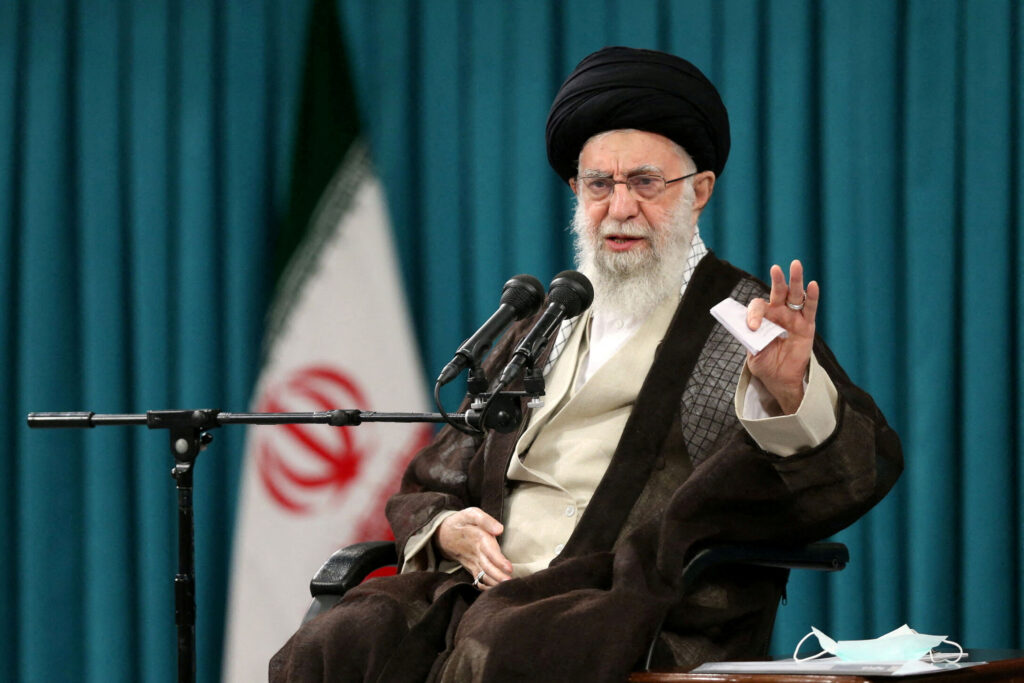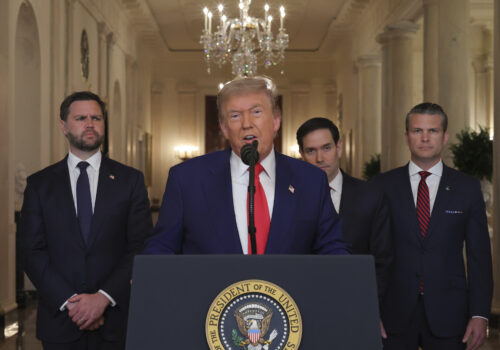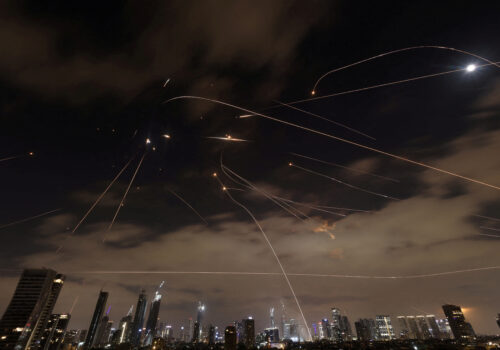Just over one week ago, when Israel began its campaign of strikes on Iran, I argued that “Iran cannot be allowed to possess a nuclear weapon or to continue to blackmail the world with its capacity to break out and acquire such weapons.” I then added that “it would be more effective, both militarily and diplomatically, for the United States rather than Israel to strike Iran’s nuclear program.” And I ended by saying, “At times like these there is no substitute for Washington exercising decisive leadership, rather than waiting to be at the mercy of decisions made by others.” Trump has now clearly made this decision.
Tactically, there is no reason to doubt what Trump stated on Saturday night—that the strikes were a “spectacular success.” Strategically, while the risks are high and the final outcomes are far from certain, I believe Trump made the right call.
The regime is in a fundamentally weak position and should leap at this last opportunity to save itself.
The exact nature of those risks and the potential for those outcomes now depend on decisions to be made in Tehran. The strategic choices for Iran’s supreme leader, Ayatollah Ali Khamenei, are clear. One option is for him to “drink from a poisoned chalice,” as his predecessor did to end the Iran-Iraq war, and negotiate directly and immediately with Trump to end the conflict. That would require, at minimum, an Iranian agreement to forever forgo any domestic enrichment, much less the pursuit of nuclear weapons. It’s possible that this agreement may also include commitments to restrict other external Iranian malign behaviors, though such commitments will be difficult to effectively enforce for years to come. In return, Iran would require Trump to give Israel a firm and public red light against any further strikes on Iran.
This would be a stark strategic setback for Iran, but a fitting consequence of a series of unwise and dangerous decisions made by the Islamic Republic over the last year and half. This would be the smart decision for the supreme leader to make, even if he has to face down hardliners within his government, especially those with guns. This option offers the best chance to maintain the theocracy’s stranglehold on the Iranian population, which will undoubtedly become increasingly and justifiably restless in the weeks to come. The regime is in a fundamentally weak position and should leap at this last opportunity to save itself, as this is clearly Trump’s preferred outcome. As a positive secondary effect, this scenario would also likely accelerate a decision by Hamas to accept the temporary cease-fire and hostage deal offer that has been on the table.
The other option would be for Tehran to continue its unblemished track record of strategic malpractice and to escalate the conflict even further. This could include, either directly or through its remaining proxies, targeting US forces in the region, attacking energy resources across the Gulf or shipping in the Strait of Hormuz, or conducting terrorism against Americans around the world. This scenario is terrible to contemplate, since Iran continues to possess thousands of short-range missiles that can’t reach Israel but could threaten US forces and decimate the Gulf.
The predictable result of this choice would be for the United States and Israel to expand its air campaign to target Iran’s wider military capabilities, its political leadership, its electrical grid, and symbols of the regime’s power. If the conflict continues further, expect attacks on Iranian energy and economic targets. If the supreme leader opts for this scenario, then he will deserve the likely outcome, even though the Iranian people definitely will not. In the end, it is sadly easy to imagine the horrible destruction that would rain down on Iran in this scenario. But it is nearly impossible to see the regime surviving it—and what would succeed the regime is profoundly unpredictable at this point.
This scenario raises another key concern, one that may become the most important factor as we consider future possibilities in the Middle East. If a wider war is to be waged in the weeks ahead, and if the proverbial strategic map of the Middle East is to be redrawn in the months and years that follow, then neither Trump nor Israeli Prime Minister Benjamin Netanyahu inspire deep confidence.
Netanyahu, who has always been a better tactician than strategist, is now far more prone to take risks. Despite his military successes, he remains deeply divisive at home. Meanwhile, the key officials who worked on Iran in Trump’s first term have virtually all failed to secure positions in his second administration or have been excommunicated entirely. Moreover, the remaining senior officials in the second term who would have been well positioned to advise on Iran were all fired only last month.
Just over twenty years ago, US Secretary of Defense Donald Rumsfeld famously said that “You go to war with the army you have, not the army you might want.” Today, we have to similarly observe that we go to war with the governments we have, both in Washington and in Jerusalem, not the governments we might want.
William F. Wechsler is the senior director for Middle East Programs at the Atlantic Council. His last position in the US government was deputy assistant secretary of defense for special operations and combatting terrorism.
Further reading
Sat, Jun 21, 2025
Experts react: The United States just bombed Iran’s nuclear sites. Here’s what to expect next.
New Atlanticist By
Early on Sunday morning in the Middle East, US forces targeted Fordow, Natanz, and Isfahan. Atlantic Council experts survey the fallout for Iran and for the region.
Sat, Jun 14, 2025
Israel’s Iran strike provides a historic chance for Middle East realignment
Inflection Points By Frederick Kempe
History will remember this moment less for the Israeli strikes themselves and more for what follows.
Mon, Jun 16, 2025
Twenty questions (and expert answers) on the Israel-Iran war
MENASource By
The escalation between Israel and Iran has raised many important questions about a region already facing crises on multiple fronts.
Image: Iran's Supreme Leader Ayatollah Ali Khamenei speaks during a meeting with a group of students in Tehran, Iran November 2, 2022. Office of the Iranian Supreme Leader/WANA (West Asia News Agency)/Handout via REUTERS



